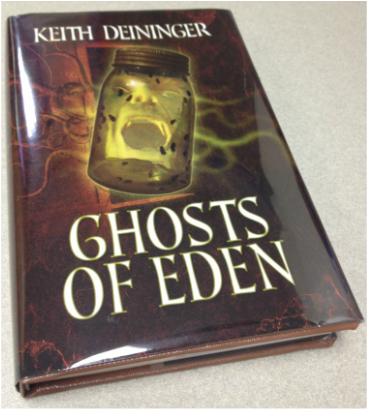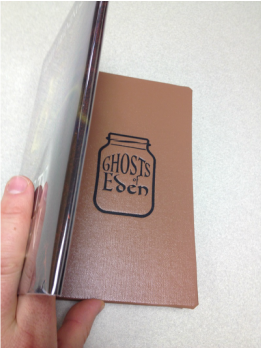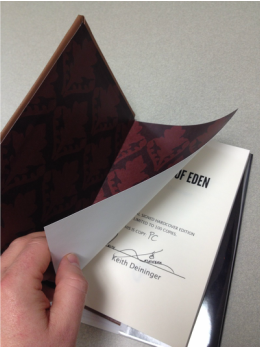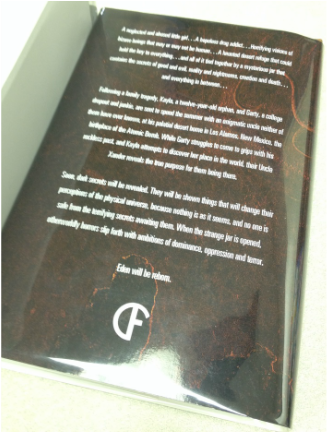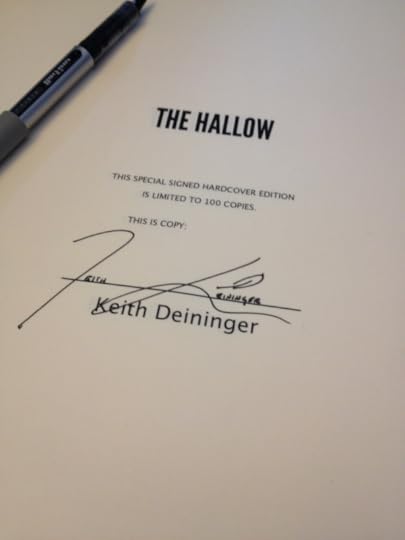Keith Deininger's Blog, page 6
March 8, 2015
Complete Transparency #1: 3 Reasons I Have Chosen Self-Publishing
I want to be clear from the beginning–this is an experiment. I don’t know quite what to expect. I know there are a lot of conflicting opinions concerning self-publishing. It’s a major issue of contention at the moment. There are three major paths to publication–traditional, small press, and self (for the lowdown on your options, check […]
Published on March 08, 2015 12:26
March 3, 2015
How I Came to be a Published Novelist
I have, in a lot of ways, been very lucky when it comes to my path to publication. My writing is…well, different, not easy to classify. Most of my works have elements of horror, fantasy, science fiction and literary fiction. And when I say “literary,” I’m not trying to sound snobbish, I only mean to […]
Published on March 03, 2015 08:37
An Exclusive Excerpt from WITHIN
My latest novel, WITHIN (Publisher: DarkFuse, Release date: May 5, 2015) 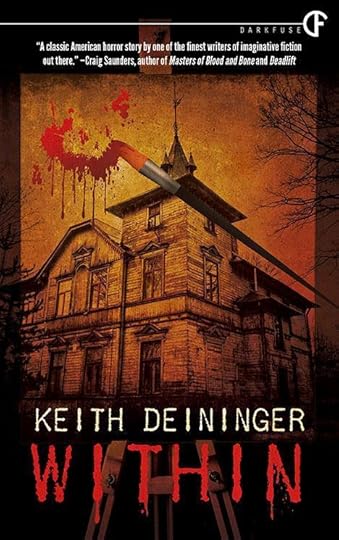 I’ve known, I think, instinctively from the very beginning, he is dangerous.
I’ve known, I think, instinctively from the very beginning, he is dangerous.
Sometimes, he looks at me funny, appraising, smiling. He lets me work in my own way, at my own pace, and that’s all I can ask for. He visits me sometimes when I’m working to ask a few simple questions, always circling back to how much time it will take me to finish. I can never tell him. I don’t exactly know what I’m doing, what I’m creating—I only know that it has to be just right, that each brushstroke has to be precise, my subject shaped to perfection. There are entire days when I am forced to paint over what I have done because it isn’t good enough. I only know that I am working toward something important, something meaningful and powerful. I have to trust in my artistic instincts. He tells me not to worry, that I’m doing a good job, but sometimes I wonder. He tells me not to think too hard about it, that true artistic expression comes from something deep within, yet larger than ourselves.
“Colin,” Mr. Klimt says, looking me in the eyes. “It is not ours to question, but to create…”
PART ONE: THE PARTY
“There was much of the beautiful, much of the wanton, much of the bizarre, something of the terrible, and not a little of that which might have excited disgust.”
―Edgar Allan Poe, The Masque of the Red Death
1. KLIMT
People talked, of course. People said he’d once had a family, a loving wife, but she’d killed herself and their two daughters. People said his life was filled with tragedy, that he’d been bankrupt and destitute, despite his Harvard education, but that he’d made a triumphant return, come into a large fortune, and now had one of the largest private art collections in western America. They said he had a Dali. They said he had several of da Vinci’s original sketches. They said he’d made his money on the stock market, or as a diplomat for a foreign ruler, or as a Hollywood movie producer, or in an inheritance from a great uncle he’d never known. They said he’d killed a man who cheated him over a poker game.
But, despite what people said, or perhaps because of it, he was a man generally well-liked and well-regarded in the community, although he’d only lived in Mesa Rapids for a few months, mostly due to his free-spirited generosity with his money, and the lavish parties he held, to which everyone in town longed to be invited.
In fact, ever since Harold Klimt had come to Mesa Rapids, people in town had been acting strangely—more foolhardy, more excitable than usual. But that was only the normal course of things when a new and rousing face appeared in town. After all, many wealthy and eclectic characters lived in Mesa Rapids. There were well-to-do horse ranchers and businessmen, artists and art collectors, inheritors of oil fortunes, and several people in the Hollywood movie industry—producers and directors, camera operators and special-effects engineers, and everyone in between—Mesa Rapids’s scenic landscapes and surrounding desert being the perfect setting for films ranging from Westerns to other worldly science fiction, further incentivized by the state’s support of the industry through massive tax write-offs.
Most of the wealthiest people lived atop Aspen Mesa, a small plateau, twenty miles across, rising above the surrounding river valley; the poorest, below, where the hobbled houses and trailers clung between the train tracks and the Colorado River, there being no middle class in Mesa Rapids. Below the extravagance—the perfectly contoured adobe walls selected for their muted sandstone color; the horse trails and private parks; the ponds, and brooks, and aspen orchards that blazed stunning colors of orange and red in the fall; ridiculous gabled towers; private pools and fields—the less fortunate congregated. These people were comprised of the usual assortment of maintenance workers, and teachers, and young adults still struggling to find direction for their lives—especially within the artist’s community that was a prominent part of the culture in Mesa Rapids. The citizens of “the valley” rarely intermingled with those of “the hill,” except for the occasional town meeting or when an art collector took a fancy in an artist and sent a car to drive the lucky individual up the hill to be paraded about as a “discovery,” with lazy bravado and condescension.
Which is why people found it peculiar when Klimt, a man with seemingly endless resources, had chosen the Upshaw Mansion—abandoned and dilapidated—in the valley by the train tracks, as his place of residence.
2. COLIN
“You’re such an asshole,” Colin Thorne said.
His friend Derek smiled, driving the car. “Why? Because she’s your sister?”
“Fuck you.”
“If you insist, but I’d rather fuck Stephanie. She has needs, man. Just like everybody. She’d like it.”
Colin groaned. “I should have known better than to show you that picture.”
Derek chuckled. “Yeah, can you send it to me? The one where she’s in the booty shorts? Is she on Facebook?”
“She’s fourteen, you horny fuck!”
“All right, all right.”
Derek floored the car through a yellow light.
“Are Phil and Bennie still having that party this weekend?” Colin asked.
“Fuck yeah, they are.” Derek shifted restlessly in his seat. “One thousand Jell-O shots.”
“A thousand? That’s a lot, man. They’ll never make that many.”
“They almost did last time.”
“Almost.”
Last time, a couple of weeks ago, Colin had watched Derek spew colorful chunks of undigested Jell-O across the bathroom floor before he could help his friend to the toilet. “Shit,” Derek had said, his shaggy hair matting on the toilet’s rim. “This shit’s never coming out.” Colin had slumped against the wall, woozy and disoriented. He’d watched Derek retch, spew, retch again. Someone had pounded on the door and Colin had yelled, “Occupied!” From the toilet, Derek had mumbled, “Yeah, too much...never coming out...”
Colin had laughed, “I think you puked it all up, man.”
“No...not that...this dream...every night...this nightmare...”
Derek had been Colin’s friend since they were boys—sort of. They’d been in the same first-grade class. They’d walked to and from school together every day, taking turns kicking rocks or pinecones, tightrope-walking the curb, hiding behind bushes to throw snowballs at the girls from their class. The year after that, however, Derek had been in a different class and their friendship had drifted apart. Derek hadn’t spoken to him again until they were in high school, Colin being shy and always unsure of himself, spending his time playing video games with his friends, while Derek played soccer and wouldn’t have anything to do with the nerd crowd. But in high school, a girl named Sarah had convinced him to try a cigarette and, even though he was shy, Colin would have done anything for Sarah and her freckled nose and her auburn eyes and her curving hips, and had begun hanging out at the “Cancer Pit” behind the school. At first, he clutched by Sarah’s side, too intimidated to speak, but when he’d come around the corner one day after science class and seen her sloppily kissing Jack Stanton while Jack rammed his hand up her blouse, he’d been devastated. It had been Derek, who’d been watching him closely from within the smoker’s circle, who had taken him aside and said, “Fuck her, man. She’s a dumb slut anyway. Everyone knows it.”
He began hanging out with Derek again, first smoking in the old Toyota Four Runner Derek had gotten for his sixteenth birthday while they drove around town, then drinking beer stolen from Derek’s father’s private stash in the garage.
When Colin had turned eighteen, their senior year, Derek had taken him to a place called “The Ice House” and forced him up on stage. Colin had been petrified with embarrassment at the bulge in his pants and mortified for the girls slapping their breasts in his face. He’d been disgusted and fascinated when one of the girls had made a show of launching Ping-Pong balls from one side of the room to the other. He’d been offended at the spectacle, as he’d been taught to be by his Christian parents, although the bulge in his pants had continued to throb, almost painfully, with heat.
When Derek had announced he was going to the state college in town, Colin had decided to go there too; it was the only school he applied to. They’d been dorm mates. Colin wanted to be an illustrator and took an introductory drawing class along with several of the usual recommended/required bullshit classes (like Astronomy and Psychology 101). Derek, as far as Colin could tell, had not chosen a major nor shown any interest in one; Derek rarely attended his classes.
Only a month into the semester, Derek had shown up in their dorm room with a huge duffle bag clinking with bottles—Permafrost, and Goldschlager, and Hot Damn 100, among others. “Go ahead,” Derek had said, grinning that shit-eater’s grin of his, “open it.” Colin had tugged the zipper back, the flaps on the duffle bag peeling outward like trembling lips, and stared inside. “What?”
Derek nodded his head: “Shrooms.”
The large Ziploc freezer bag had been filled with dried and shriveled brown things. Together, they’d passed a bottle back and forth, until they were slurring their words, and had the courage to eat the mushrooms. Derek had gobbled a few and grinned: “Here we go.” Colin had chewed them tentatively, like cardboard, but had still taken too many.
The lights had brightened, the colors deepened. The blankets on the beds had begun to crawl down over the floor like creeping slugs. Colin couldn’t speak, although he’d been aware of Derek mumbling constantly. It had felt like many hours, sitting in one place, staring around the room. In the early hours of the morning, Colin had looked up and Derek was passed out on his bed. He’d stood, his legs like rubber strands, and tentatively taken a step. He’d realized then that the floor was covered with piles of luminous eggs and that with each step he took he crushed more of those eggs. When all the eggs were crushed, his life would be over. He’d slumped to the floor and cried, as the pastel sun began to fill the room with light.
Not long after that, Derek had been kicked out of school. They’d been at a house party of a friend of theirs, but it hadn’t been as big as their friend had thought, and in the morning, still drunk and reeling, Derek had said how funny it would be to fill balloons with flat, leftover beer from the keg. Colin had been too hungover to go with him and heard later that Derek had been caught on the roof of their dormitory tossing his beer balloons at girls as they walked by (just as Colin and he had tossed snowballs when they were kids), aiming for their chests, screaming, “Wet T-shirt contest!” at the top of his lungs over and over.
Derek got a job making sandwiches and Colin stayed in school, eventually taking more art classes and becoming a somewhat skilled painter; he was on track for a graduate program at a nice art school out of state. Colin still hung out with Derek on the weekends and they still partied together.
“Hey, slow down,” Colin said. “You’re going to get a ticket.”
Derek scoffed. “Who gives a fuck?”
It was Saturday afternoon and they were hanging out, driving around, shooting the shit, but Derek seemed, to Colin, more reckless than usual. Derek had dark bags under his eyes, as if he hadn’t been sleeping well.
“What do you want to do tonight?”
“I don’t give a fuck,” Derek said; his eyes looked glassy, stoned.
“We could... Hey! Watch it!”
The SUV didn’t see them speeding through the red light and clipped them in the rear-left fender, jolting the car ninety degrees in the wrong direction. Derek’s hands flew off the wheel; grunting sounds escaped him, a deep chuckle.
The red truck, which had been accelerating through the intersection, smashed into them head-on. Derek grinned, tried to say something before he died, but his abdomen had been crushed against the steering wheel, and thick, bubbling blood covered his final words.
The first things Colin looked at were his hands, lying palms up in his lap, shaking uncontrollably. He took one look at his friend—jutting bones shiny with blood, steaming, neck wrenched, face turned toward him, grinning hollowly—and threw up. It’s my turn, old buddy, he thought crazily. It’s my turn to puke. He gripped the door handle and pushed the car door open. He fell to the pavement, scraping his knees. He stood. He seemed to be unharmed. He blinked. Other drivers were getting out of their cars and rushing toward him.
Coming in May... Until then, check out some of Keith Deininger's other titles here.
 I’ve known, I think, instinctively from the very beginning, he is dangerous.
I’ve known, I think, instinctively from the very beginning, he is dangerous. Sometimes, he looks at me funny, appraising, smiling. He lets me work in my own way, at my own pace, and that’s all I can ask for. He visits me sometimes when I’m working to ask a few simple questions, always circling back to how much time it will take me to finish. I can never tell him. I don’t exactly know what I’m doing, what I’m creating—I only know that it has to be just right, that each brushstroke has to be precise, my subject shaped to perfection. There are entire days when I am forced to paint over what I have done because it isn’t good enough. I only know that I am working toward something important, something meaningful and powerful. I have to trust in my artistic instincts. He tells me not to worry, that I’m doing a good job, but sometimes I wonder. He tells me not to think too hard about it, that true artistic expression comes from something deep within, yet larger than ourselves.
“Colin,” Mr. Klimt says, looking me in the eyes. “It is not ours to question, but to create…”
PART ONE: THE PARTY
“There was much of the beautiful, much of the wanton, much of the bizarre, something of the terrible, and not a little of that which might have excited disgust.”
―Edgar Allan Poe, The Masque of the Red Death
1. KLIMT
People talked, of course. People said he’d once had a family, a loving wife, but she’d killed herself and their two daughters. People said his life was filled with tragedy, that he’d been bankrupt and destitute, despite his Harvard education, but that he’d made a triumphant return, come into a large fortune, and now had one of the largest private art collections in western America. They said he had a Dali. They said he had several of da Vinci’s original sketches. They said he’d made his money on the stock market, or as a diplomat for a foreign ruler, or as a Hollywood movie producer, or in an inheritance from a great uncle he’d never known. They said he’d killed a man who cheated him over a poker game.
But, despite what people said, or perhaps because of it, he was a man generally well-liked and well-regarded in the community, although he’d only lived in Mesa Rapids for a few months, mostly due to his free-spirited generosity with his money, and the lavish parties he held, to which everyone in town longed to be invited.
In fact, ever since Harold Klimt had come to Mesa Rapids, people in town had been acting strangely—more foolhardy, more excitable than usual. But that was only the normal course of things when a new and rousing face appeared in town. After all, many wealthy and eclectic characters lived in Mesa Rapids. There were well-to-do horse ranchers and businessmen, artists and art collectors, inheritors of oil fortunes, and several people in the Hollywood movie industry—producers and directors, camera operators and special-effects engineers, and everyone in between—Mesa Rapids’s scenic landscapes and surrounding desert being the perfect setting for films ranging from Westerns to other worldly science fiction, further incentivized by the state’s support of the industry through massive tax write-offs.
Most of the wealthiest people lived atop Aspen Mesa, a small plateau, twenty miles across, rising above the surrounding river valley; the poorest, below, where the hobbled houses and trailers clung between the train tracks and the Colorado River, there being no middle class in Mesa Rapids. Below the extravagance—the perfectly contoured adobe walls selected for their muted sandstone color; the horse trails and private parks; the ponds, and brooks, and aspen orchards that blazed stunning colors of orange and red in the fall; ridiculous gabled towers; private pools and fields—the less fortunate congregated. These people were comprised of the usual assortment of maintenance workers, and teachers, and young adults still struggling to find direction for their lives—especially within the artist’s community that was a prominent part of the culture in Mesa Rapids. The citizens of “the valley” rarely intermingled with those of “the hill,” except for the occasional town meeting or when an art collector took a fancy in an artist and sent a car to drive the lucky individual up the hill to be paraded about as a “discovery,” with lazy bravado and condescension.
Which is why people found it peculiar when Klimt, a man with seemingly endless resources, had chosen the Upshaw Mansion—abandoned and dilapidated—in the valley by the train tracks, as his place of residence.
2. COLIN
“You’re such an asshole,” Colin Thorne said.
His friend Derek smiled, driving the car. “Why? Because she’s your sister?”
“Fuck you.”
“If you insist, but I’d rather fuck Stephanie. She has needs, man. Just like everybody. She’d like it.”
Colin groaned. “I should have known better than to show you that picture.”
Derek chuckled. “Yeah, can you send it to me? The one where she’s in the booty shorts? Is she on Facebook?”
“She’s fourteen, you horny fuck!”
“All right, all right.”
Derek floored the car through a yellow light.
“Are Phil and Bennie still having that party this weekend?” Colin asked.
“Fuck yeah, they are.” Derek shifted restlessly in his seat. “One thousand Jell-O shots.”
“A thousand? That’s a lot, man. They’ll never make that many.”
“They almost did last time.”
“Almost.”
Last time, a couple of weeks ago, Colin had watched Derek spew colorful chunks of undigested Jell-O across the bathroom floor before he could help his friend to the toilet. “Shit,” Derek had said, his shaggy hair matting on the toilet’s rim. “This shit’s never coming out.” Colin had slumped against the wall, woozy and disoriented. He’d watched Derek retch, spew, retch again. Someone had pounded on the door and Colin had yelled, “Occupied!” From the toilet, Derek had mumbled, “Yeah, too much...never coming out...”
Colin had laughed, “I think you puked it all up, man.”
“No...not that...this dream...every night...this nightmare...”
Derek had been Colin’s friend since they were boys—sort of. They’d been in the same first-grade class. They’d walked to and from school together every day, taking turns kicking rocks or pinecones, tightrope-walking the curb, hiding behind bushes to throw snowballs at the girls from their class. The year after that, however, Derek had been in a different class and their friendship had drifted apart. Derek hadn’t spoken to him again until they were in high school, Colin being shy and always unsure of himself, spending his time playing video games with his friends, while Derek played soccer and wouldn’t have anything to do with the nerd crowd. But in high school, a girl named Sarah had convinced him to try a cigarette and, even though he was shy, Colin would have done anything for Sarah and her freckled nose and her auburn eyes and her curving hips, and had begun hanging out at the “Cancer Pit” behind the school. At first, he clutched by Sarah’s side, too intimidated to speak, but when he’d come around the corner one day after science class and seen her sloppily kissing Jack Stanton while Jack rammed his hand up her blouse, he’d been devastated. It had been Derek, who’d been watching him closely from within the smoker’s circle, who had taken him aside and said, “Fuck her, man. She’s a dumb slut anyway. Everyone knows it.”
He began hanging out with Derek again, first smoking in the old Toyota Four Runner Derek had gotten for his sixteenth birthday while they drove around town, then drinking beer stolen from Derek’s father’s private stash in the garage.
When Colin had turned eighteen, their senior year, Derek had taken him to a place called “The Ice House” and forced him up on stage. Colin had been petrified with embarrassment at the bulge in his pants and mortified for the girls slapping their breasts in his face. He’d been disgusted and fascinated when one of the girls had made a show of launching Ping-Pong balls from one side of the room to the other. He’d been offended at the spectacle, as he’d been taught to be by his Christian parents, although the bulge in his pants had continued to throb, almost painfully, with heat.
When Derek had announced he was going to the state college in town, Colin had decided to go there too; it was the only school he applied to. They’d been dorm mates. Colin wanted to be an illustrator and took an introductory drawing class along with several of the usual recommended/required bullshit classes (like Astronomy and Psychology 101). Derek, as far as Colin could tell, had not chosen a major nor shown any interest in one; Derek rarely attended his classes.
Only a month into the semester, Derek had shown up in their dorm room with a huge duffle bag clinking with bottles—Permafrost, and Goldschlager, and Hot Damn 100, among others. “Go ahead,” Derek had said, grinning that shit-eater’s grin of his, “open it.” Colin had tugged the zipper back, the flaps on the duffle bag peeling outward like trembling lips, and stared inside. “What?”
Derek nodded his head: “Shrooms.”
The large Ziploc freezer bag had been filled with dried and shriveled brown things. Together, they’d passed a bottle back and forth, until they were slurring their words, and had the courage to eat the mushrooms. Derek had gobbled a few and grinned: “Here we go.” Colin had chewed them tentatively, like cardboard, but had still taken too many.
The lights had brightened, the colors deepened. The blankets on the beds had begun to crawl down over the floor like creeping slugs. Colin couldn’t speak, although he’d been aware of Derek mumbling constantly. It had felt like many hours, sitting in one place, staring around the room. In the early hours of the morning, Colin had looked up and Derek was passed out on his bed. He’d stood, his legs like rubber strands, and tentatively taken a step. He’d realized then that the floor was covered with piles of luminous eggs and that with each step he took he crushed more of those eggs. When all the eggs were crushed, his life would be over. He’d slumped to the floor and cried, as the pastel sun began to fill the room with light.
Not long after that, Derek had been kicked out of school. They’d been at a house party of a friend of theirs, but it hadn’t been as big as their friend had thought, and in the morning, still drunk and reeling, Derek had said how funny it would be to fill balloons with flat, leftover beer from the keg. Colin had been too hungover to go with him and heard later that Derek had been caught on the roof of their dormitory tossing his beer balloons at girls as they walked by (just as Colin and he had tossed snowballs when they were kids), aiming for their chests, screaming, “Wet T-shirt contest!” at the top of his lungs over and over.
Derek got a job making sandwiches and Colin stayed in school, eventually taking more art classes and becoming a somewhat skilled painter; he was on track for a graduate program at a nice art school out of state. Colin still hung out with Derek on the weekends and they still partied together.
“Hey, slow down,” Colin said. “You’re going to get a ticket.”
Derek scoffed. “Who gives a fuck?”
It was Saturday afternoon and they were hanging out, driving around, shooting the shit, but Derek seemed, to Colin, more reckless than usual. Derek had dark bags under his eyes, as if he hadn’t been sleeping well.
“What do you want to do tonight?”
“I don’t give a fuck,” Derek said; his eyes looked glassy, stoned.
“We could... Hey! Watch it!”
The SUV didn’t see them speeding through the red light and clipped them in the rear-left fender, jolting the car ninety degrees in the wrong direction. Derek’s hands flew off the wheel; grunting sounds escaped him, a deep chuckle.
The red truck, which had been accelerating through the intersection, smashed into them head-on. Derek grinned, tried to say something before he died, but his abdomen had been crushed against the steering wheel, and thick, bubbling blood covered his final words.
The first things Colin looked at were his hands, lying palms up in his lap, shaking uncontrollably. He took one look at his friend—jutting bones shiny with blood, steaming, neck wrenched, face turned toward him, grinning hollowly—and threw up. It’s my turn, old buddy, he thought crazily. It’s my turn to puke. He gripped the door handle and pushed the car door open. He fell to the pavement, scraping his knees. He stood. He seemed to be unharmed. He blinked. Other drivers were getting out of their cars and rushing toward him.
Coming in May... Until then, check out some of Keith Deininger's other titles here.
Published on March 03, 2015 08:21
February 13, 2015
Happy Friday the 13th!
Today is something of a holiday in the horror community and I've seen a lot of great things going on sale. My own works are no exception. Here are my contributions: My introductory short story collection is free right now! Click the cover image to grab your copy:
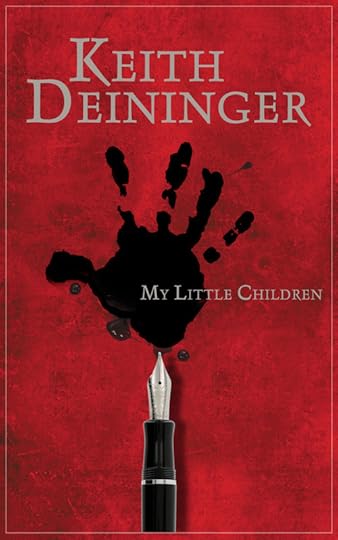 My debut novel is on sale for $0.99! Click the cover image to get your copy:
My debut novel is on sale for $0.99! Click the cover image to get your copy: 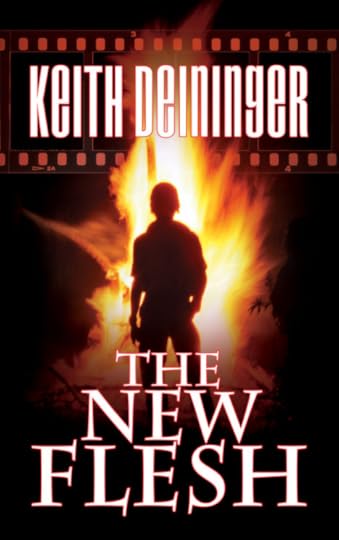 Please feel free to share this post and spread the word
Please feel free to share this post and spread the word
And may tomorrow be an excellent Valentine's day!
 My debut novel is on sale for $0.99! Click the cover image to get your copy:
My debut novel is on sale for $0.99! Click the cover image to get your copy:  Please feel free to share this post and spread the word
Please feel free to share this post and spread the wordAnd may tomorrow be an excellent Valentine's day!
Published on February 13, 2015 10:04
February 4, 2015
Look Out For… Trigger Warning by Neil Gaiman and The Hallow by Keith Deininger
 Great review for THE HALLOW along with Neil Gaiman's latest story collection TRIGGER WARNING on the This is Horror UK site. I'm thrilled to be in such company!
Great review for THE HALLOW along with Neil Gaiman's latest story collection TRIGGER WARNING on the This is Horror UK site. I'm thrilled to be in such company!Check it out: THIS IS HORROR
Published on February 04, 2015 07:57
January 2, 2015
The Hallowgeons - An Excerpt from Work in Progress
He was visited by the hallowgeons.
It happened as it had two times before, while he looked over the City from his viewing platform and contemplated the politics of the hierotimates. After the last visitation, he had made it his business to be present in this location every evening he was able. The hallowgeons did not conform to any schedule but their own, their ways mysterious and strange. They often did things that did not seem to serve any rational purpose, yet claimed it was their task to impart wisdom to the human race. They claimed to be guardians of some sort. How was it the one known as Cadoc had described it? “...to preserve universal balance and aesthetics…” Whatever that was supposed to mean.
The first time he’d seen their ship, an irrational horror had filled him. Not because he felt his life was in danger, but because he was before something that every fiber of his being felt should not exist, something not of this world. It had been hovering silently in the air next to the ziggurat, several feet above his balcony. It was an incomprehensibly intricate design, with details that somehow eluded his examination, giving it a hazy and gray quality, as if his human eyes did not have the proper faculties to process all that was before him. It was a ship very different from the aerials, even Marrow’s, the largest and most renowned of the airships, capable of elevations far higher, far above the clouds, travelling into regions not understood by humanity, where the hallowgeons must live. Above the clouds there was said to be a place referenced only as “the void” in the text Lemmenkainen had given him, an ancient tome without a title, the personal understandings and scientific observations of an Arkaine from the first age of the world who had perished long ago.
“Good evening, Trevor,” a strange voice spoke from behind him, and when he turned, his heart immediately began to beat furiously in his chest.
Three hallowgeons were standing behind him. Gray robes draped their bodies, as if to conceal anatomies his eyes might find twisted and displeasing to gaze upon, hoods up over their heads so that only their pale faces were visible. They were very tall, the shortest at perhaps a little over nine feet, the tallest closer to ten.
“We are well met,” Cadoc said, in a voice Trevor knew as the most normal of the three, yet that seemed to possess an echo of sorts, each cadence reverberating in his skull and lingering, fading only reluctantly.
“Welcome,” Trevor managed, swallowing, doing his best to collect himself and hide his discomfort. Even with the masks the hallowgeons wore, their presence was still disconcerting. The identically blank and pale visages the three wore could not conceal their eyes, that peered from slits, larger than human eyes, Cadoc’s shot with veins so yellow they seemed to glow, the one known as Mithra (who had spoken initially) almost white and filled with milky wriggling movement, and the one known as Siriac (the tallest of the three) so black it were as if he possessed no eyes at all.
“We have come to impart upon you certain information so that you might act in a way we find pleasing,” Siriac said, in a voice so deep and hollow that one felt rather than heard it.
“I…” Trevor took a deep breath. “I have been waiting.”
It happened as it had two times before, while he looked over the City from his viewing platform and contemplated the politics of the hierotimates. After the last visitation, he had made it his business to be present in this location every evening he was able. The hallowgeons did not conform to any schedule but their own, their ways mysterious and strange. They often did things that did not seem to serve any rational purpose, yet claimed it was their task to impart wisdom to the human race. They claimed to be guardians of some sort. How was it the one known as Cadoc had described it? “...to preserve universal balance and aesthetics…” Whatever that was supposed to mean.
The first time he’d seen their ship, an irrational horror had filled him. Not because he felt his life was in danger, but because he was before something that every fiber of his being felt should not exist, something not of this world. It had been hovering silently in the air next to the ziggurat, several feet above his balcony. It was an incomprehensibly intricate design, with details that somehow eluded his examination, giving it a hazy and gray quality, as if his human eyes did not have the proper faculties to process all that was before him. It was a ship very different from the aerials, even Marrow’s, the largest and most renowned of the airships, capable of elevations far higher, far above the clouds, travelling into regions not understood by humanity, where the hallowgeons must live. Above the clouds there was said to be a place referenced only as “the void” in the text Lemmenkainen had given him, an ancient tome without a title, the personal understandings and scientific observations of an Arkaine from the first age of the world who had perished long ago.
“Good evening, Trevor,” a strange voice spoke from behind him, and when he turned, his heart immediately began to beat furiously in his chest.
Three hallowgeons were standing behind him. Gray robes draped their bodies, as if to conceal anatomies his eyes might find twisted and displeasing to gaze upon, hoods up over their heads so that only their pale faces were visible. They were very tall, the shortest at perhaps a little over nine feet, the tallest closer to ten.
“We are well met,” Cadoc said, in a voice Trevor knew as the most normal of the three, yet that seemed to possess an echo of sorts, each cadence reverberating in his skull and lingering, fading only reluctantly.
“Welcome,” Trevor managed, swallowing, doing his best to collect himself and hide his discomfort. Even with the masks the hallowgeons wore, their presence was still disconcerting. The identically blank and pale visages the three wore could not conceal their eyes, that peered from slits, larger than human eyes, Cadoc’s shot with veins so yellow they seemed to glow, the one known as Mithra (who had spoken initially) almost white and filled with milky wriggling movement, and the one known as Siriac (the tallest of the three) so black it were as if he possessed no eyes at all.
“We have come to impart upon you certain information so that you might act in a way we find pleasing,” Siriac said, in a voice so deep and hollow that one felt rather than heard it.
“I…” Trevor took a deep breath. “I have been waiting.”
Published on January 02, 2015 12:03
December 18, 2014
Ah, a Thing of Beauty...
Published on December 18, 2014 12:33
December 17, 2014
Can the "Nice Guy" Make it in Publishing?
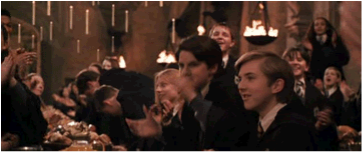 Yesterday, something really amazing happened. It was very simple and I didn't think anything of it at the time, but the response I got blew me away. I liked a negative review for one of my books on Goodreads, and then...
Yesterday, something really amazing happened. It was very simple and I didn't think anything of it at the time, but the response I got blew me away. I liked a negative review for one of my books on Goodreads, and then...Wait? Hold up. You did what?
Well, to be fair, the reviewer basically said she was going to stop reading because she wasn't into the book and so she'd decided to quit while she was ahead. So I thought, Okay, fair enough. Not everyone is going to like my work, especially this title (Ghosts of Eden). And then I liked her review. I did it because I can appreciate her honesty. I wasn't upset in any way. Why would I be? I don't like every book I read all of the time, even the ones which come highly recommended from friends, so why should I expect everyone to like my own work. Especially some of the weird-surreal stuff I write. Reviews on Goodreads and Amazon, etc. are for readers to express their honest opinions, and as long as those reviews are not mindlessly hateful, I see no problem with this. Negative reviews are not a personal attack on an author and can, and will, sell books to those readers looking for the kinds of things that the negative reviewer is not.
But what was really amazing about yesterday, was that after liking the review, the reviewer returned to say the following:
ETA: The author of this book just liked this review. Mr. Keith Deininger..you just gained a fan. We don't call out authors that behave well often enough. You took the time to do that even though the book wasn't for me. I'll give another of your books a go just for that. This led to a discussion about badly behaved authors, some new friends on Goodreads, and I even sold some books. I'm still in shock. Are there really that many authors with bad attitudes? It got me thinking... Maybe there is still an industry where the nice guy really can finish first.
Reviews are, after all, for readers, not for the authors of the work being reviewed. Once published, the work is out of the author's hands and it is up to readers to interpret and enjoy and spread the word. The last thing an author should be doing is taking personal offense to what is said in a review (with exceptions only for wearisome trolls).
As a writer, I am also a voracious reader, and there have been plenty of books I've read that I didn't like. Readers and writers are, after all, the same kinds of people. We should be understanding of each other. Have some empathy. If you don't, you shouldn't be writing, because that's really what writing is all about. We should celebrate diverse opinions and viewpoints.
As an author, I don't expect everyone to like my work, nor to find overnight success from any one title. I have two novels and four novellas published now and I still consider myself a newbie. The reason I feel this way is because I'm in this writing thing for the long haul. What's 2 years out of 20? Out of 40? I'm a real writer: I write because I enjoy expressing myself through words. I've not found anything else that excites and moves me the way writing does. I want to write. I also want to find readers who are as excited and moved by my writing as I am. And I want to eventually find financial stability with my writing. I believe I will, but it only happens one work at a time. I expect to continue to write and grow as a writer.
Too many authors, I think, expect instant success. They think that what they've written is the best thing out there and that everyone is going to love it and they're angry when anyone doesn't agree with them. This is a horrible attitude. Guess what? Writing is not easy. It's very, very difficult and takes years for anyone to develop the skills to produce anything worthy of the attention of readers. I've been writing fairly regularly since I was in high school, fifteen years ago, and have only been publishing for the last two years.
But anyway, all I mean to say is that I find what happened to me yesterday very encouraging. Authors take note. It might be the publishing world still has room for the nice guy. Man, I hope so...
Thank you readers and reviewers!
Published on December 17, 2014 09:44
December 11, 2014
November 14, 2014
Some Thoughts Concerning GHOSTS OF EDEN
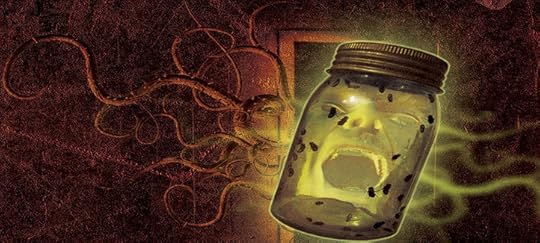 “Any sufficiently advanced technology is indistinguishable from magic.”
“Any sufficiently advanced technology is indistinguishable from magic.”—Arthur C. Clarke’s third Law of Prediction
Ghosts of Eden is, in a lot of ways, one of my more personal novels. I was nearly half-way through the first draft when I received that most amazing of calls, the call all aspiring writers hope for, that call from my publisher accepting my first novel, The New Flesh. I only mention this because I want to highlight where my head was at that time. I had written a novel that was the first one where I felt I had really accomplished something. As twisted and surreal as it was, I knew it was uniquely mine. It was written in my style, about things I wanted to write, without regard to genre or whether or not anyone was ever going to read it. I didn’t care. I’d sent it out to as many agents and publishers as I could, of course, always hopeful it would see publication, but that didn't really matter. What mattered was that it was mine. I had found something that I’d heard so much about. I had found my voice and now I was working on my next novel and I knew it was going to be better than the one before it.
And it is—Ghosts of Eden is better than The New Flesh in a lot of ways. It’s more cohesive and has stronger plot progression. It’s more focused. Ghost of Eden has strong characters that I believe many will find relatable. It also has Garty, who is, I have to admit, based on a younger, reckless, I-just-don’t-give-a-fuck version of myself. Garty is a character who showed up a lot in my writing in my early years while in college. Writing him into Ghosts of Eden has helped me to acknowledge my past and to personally move on with my life.
Speaking of my past, let’s talk about Los Alamos, New Mexico, where I lived for many years growing up. A fictionalized version of this strange, little town is the setting for most of Ghosts of Eden. My dad worked for Los Alamos National Labs (where the Manhattan Project was conducted for World War II and the birthplace of the Atomic bomb) until he retired a few years ago. It’s difficult to explain to someone who has never been there what it’s like, especially the people. It’s a small, remote town in the mountains in the middle of the desert, but not like what you’d think. There are no hillbillies and it is a far cry from the stereotypical small town you might see in a B-rate horror movie. Everyone who lives there has at least one person with an advance collegiate degree in some sort of science field in their family. It’s a community almost exclusively upper-middle class. Everyone has money. And everyone has Asperger’s syndrome…
Okay, that’s an exaggeration, but my point is that these are science-types. These are very smart people with stunted social skills. They can design and solve advance mathematical equations, but they struggle with dressing themselves properly each morning. It’s a funny place to grow up. In Ghosts of Eden I portray it as a town filled with people who live solely for scientific fact—if they can’t see it or prove it mathematically, it doesn’t exist. I use it as a foil for the inexplicable. This is not, I should point out, entirely fair. There are, after all, a lot of people who read in Los Alamos, and many who enjoy fiction and fantasy. The science museum is even called the Ray Bradbury Science Museum. So any resemblance between the fictitious locale in Ghosts of Eden and the actual Los Alamos are mostly coincidental.
I’ve used Los Alamos in this way as a means to explore one of the major themes in Ghosts of Eden: the nature of reality and the disciplines by which we come to understand it, particularly those scientific and imaginative. On the surface, science and imagination seem to have very little to do with each other. Science demands rational explanations, while imagination envisions things that are seemingly impossible. But they are actually great compliments to each other. Without the ability to imagine what is possible, one cannot set out to prove it rationally. Albert Einstein himself said, “Imagination is more important than knowledge.” Without imagination, the scientific method fails.
This is to say Ghosts of Eden was born partially out of my fascination with theoretical physics and our feeble understanding of the universe and partially out of personal experiences. It plays with the idea that magic and science are the same. Intrigued by the concepts of string theory and scientific notions that parallel universes may actually exist, I read a couple of Brian Greene’s books, especially The Hidden Reality, from which I’ve drawn inspiration for some of the lessons and rants Uncle Xander gives to Kayla and Garty in Ghosts of Eden.
But, please don’t worry. The themes and academics are not important. These things are just one writer’s interests and are not intended to detract from that which is truly important: The Story. If you’ve come looking for horror and magic, for mystery and the uncanny, for nightmares and insidious dangers, you’ve come to the right place. One reviewer on Goodreads.com said Ghosts of Eden is like “Harry Potter on amphetamines” (Paul Nelson). Another called it a “phantasmagorical horror that reads like something H. P. Lovecraft would have enjoyed” (Rabindranauth). So, you be the judge.
Keith Deininger
November 24th, 2014
Published on November 14, 2014 07:40

